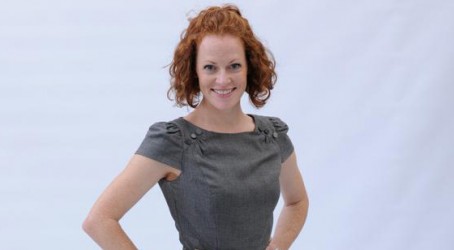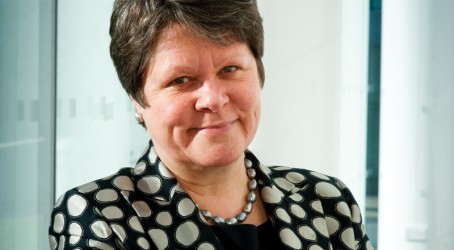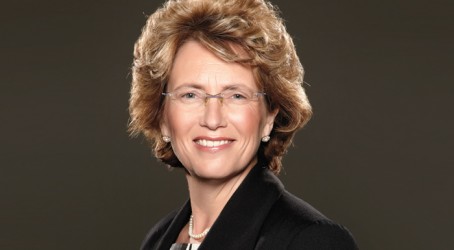Philippa Oldham, head of transport and manufacturing, IMechE
What are your experiences of being a female engineer?
I've often gone to meetings with the older generation of engineers and they have assumed that I'm there to take the minutes. Throughout my career there have been questions to my seniors about whether I am capable or not.
A lot of the senior male engineers that I have worked with have been very supportive and almost taken on a mentoring role. A key thing when you start a job, or have a job, is to find somebody in a senior position that you can relate to. They can help steer you in the right direction of being a good engineer, tell you what they have learn, and you can have a bit of a laugh together.
Why do you think this issue isn't ever getting resolved?
There isn't enough advice for girls to know what an engineer is and they don't understand the breadth of the profession. But if you look at software engineering there is a quite an influx of girls starting now, and there are more girls going into pure physics. So I think slowly we are starting to evolve. Interestingly, there was a winner of the IMechE Manufacturing Excellence awards, MBDA, who make sure that their apprenticeship scheme is 50% female. They do that by making sure that the attendance at open days, and applications for apprenticeships and summer placements is 50/50. Its a really simple idea.
What measures do you think could make the most difference?
Female engineers becoming mentors. To share your knowledge and your networks is one of things that I have found is becoming more abundant. I'm part of a mentoring programme at Kingston University. On twitter there is an appetite for female engineers. There is a website called lady geek, which is encouraging more women and girls to get involved.
Who do you think is going to be most responsible to making the change?
Its got to be a joint effort and its got to be a parental responsibility. Engineering is a team career. Playing team sports at school is about strategy and that is what it is like when you are engineering products, or you are engineering a solution to something. Its something that girls are really good at. In the school yard girls tend to have a bigger network of friends. We already have those abilities so we should share professionally.

Alexandra Knight, senior consultant, Frazer-Nash engineering consultancy
What is your experience of being a female engineer?
It is different in different sectors. For example, I work on a submarine project and I spend quite a lot of time down at the Dockyards in Plymouth. Its a traditional male environment. They are not used to having women around and I do get comments. I've had: “Its nice to have a girl around and something pretty to look at”. I joke back and say: “Well thats the reason I worked hard to get an engineering degree so that you've got something pretty to look at”. These guys assume the project teams are going to be full of male engineers, then you get a few female engineers turn up and its a bit of a novelty to them.
How important are role models?
I've had a lot of role models who have been men, but they are not in the same position as you being a woman. Maybe other people need a role model less than I do, but I think it is important to have them and female role models are lacking. Although more and more are coming through.
What do you think needs to be done to improve the statistics in terms of women's participation in engineering?
I really think that it is about raising the profile of the career prospects of being an engineer. And getting rid of the stereotype of engineering that we have in this country. We need to highlight the range of disciplines that engineering covers and how interesting it can be.
We need more TV programmes that show how great science and engineering are. There are more popular shows like that now, but we need to go even further and show the role of women rather than it being just men.
Who do you think should be driving the change?
Change has to come from the top and the bottom. It is key that government raises the profile of the importance of engineering in this country. It needs to brings back the importance of manufacturing and innovation. We need to invest in our small businesses so they can grow and develop.
At the other end of the scale, we need more engineers who are really passionate about what they do to talk about what they do, how they got to their positions, and what the prospects in engineering are. We need to spread the word and get more people to understand what a rewarding career engineering can offer.
Schools do have an important role in this, but it is a bit much to expect schools to pass on the message when they don't have any experience of it. Schools should provide the forum and engineers should go in to speak to the kids and educate the teachers.
What sort of questions do girls ask about engineering at outreach events?
They are very mature and insightful questions coming from young girls even at age nine to 10 years. Pay, long term career prospects and job security come up. Whether you get the opportunity to work in different countries also gets asked. I've had questions about whether you get paid more or less than a doctor or a lawyer and its really hard to make those comparisons.
I try to make the point that its not purely about what your salary is. I tell them that you are not going get paid as much as someone who works in the city as an investment banker, but they should also think about their quality of life and the enjoyment they get out of work.
Do you think a female graduate starting out her career this year might have a different experience from you?
I have seen an increase in the number of female engineers coming into our company. Its becoming more normal to see female engineers and its more of an attractive career for women, which creates acceptance. Female engineers starting out today shouldn't even consider being a woman an issue. Its more of a case of how good are you at engineering and how professional you are. Its these things that will make or break your career, not which sex you are.
Ultimately, looking ahead, do you think change will come and there will be a point when it will be equal in the profession?
Over the last 10 years that I have seen it has improved significantly but its not enough. I don't know whether it will ever get to the point where it is completely equal. I hope so, but I think we have still got a long way to go before we get to that point.

Dame Professor Julia King, vice-chancellor, Aston University
What is the gender balance like in academia?
The number of women in academia get smaller and smaller as you move from students, to PhD students, to academic staff, to senior academic staff. But they are not as low as they are in industry. You might be working in a building where you are meeting other academic colleagues or students from other subjects, so its not quite as concentrated as it is in a big engineering company like Rolls-Royce.
How was your experience at Rolls-Royce as a woman?
The people who worked for me were predominantly male. As I moved from one job to another almost always they would make some comment about how intimidating or weird they thought it was going to be to have a woman as a boss.
On one occasion, a group said that they thought these things at the start but very soon they began to respect me as an engineer and forgot that they had a woman as a boss. That had me in tears, it was hugely touching.
It was meant very positively, but a woman coming into a job shouldn't have to fight harder than her male colleagues to earn respect as an engineer. A male coming in would probably have had to earn their respect, but they wouldn't have been quite so conscious about it.
What is it that you think is stopping women from progressing to more senior roles within engineering companies?
There are not enough women coming in to start with. Some of the women that do enter the profession choose to go into other areas like policy and business improvement where the environment is not so intellectually aggressive. In these areas there is also less of an extreme gender imbalance.
I think there is still a degree of subconscious, unintended expectation that has been baked into us right through our careers that men will be more ambitious and will get promoted more quickly than women.
Research by the Athena Group looked at women in academia and promotion. The study had responses from several thousand employees, both male and female. It showed very clearly that men are much more likely to be encouraged to put themselves forward for promotion than women at the same level in the organisation. So there is an assumption that men are ready for promotion sooner than women.
Another study looked the CVs of applicants for a couple of jobs. The CVs were passed around for assessment by male and female colleagues and the applicants with a male name on the CV were more likely to be deemed suitable for the job. There was also a very significant difference in the salary level that the assessors recommended each person received. Several thousand pounds just for a change to a male name. It's not a bias that men have, it's a bias that we all absorb from the environment and I don't think that helps.
What do you think that the profession needs to do to overcome this?
You have to make people aware of this bias, and be on the look out for it. We need to make sure that throughout the application process someone is challenging any assumptions made about interview candidates.
In some cases, it is very helpful to agree the assessment criteria before the interview, and mark candidates rigorously before you meet them.
We need to do more to help women be confident in these different environments too. We need to encourage companies to have woman's networks and mentoring.
Companies need to talk to women about the benefits of this and get women to take these things up.
What role do you think that universities have to play in solving this problem?
We've got to do a better job of going into schools and making sure that girls can see that engineering is a subject they can enjoy. A lot of school careers advice still sees engineering as an oily job that involves lifting large weights and that women wouldn't want to do that. We've got to rid of that idea among teachers, careers advisors, and also parents.
Careers advisors may try and dissuade girls interested in engineering by telling them that they might be outnumbered by men and that its a high pressure environment. But if girls are interested in engineering, we need to give them the tools and support that enable them to survive and thrive in a male dominated environment. We should be finding ways to give them the confidence and make them resourceful enough to enjoy it. Engineering is a hugely fun job. It can be done in the same sterile conditions as medicine, and you are rarely even allowed to lift a heavy weight these days.
Ultimately do you think that change will come?
I don't see why it shouldn't, we know it can be done. The Soviet Union had 50% female engineers in many of their engineering professions and in this country women took over men's jobs in engineering during the first world war. We've got to make sure that role models, good teaching and support is in place. A lot of women who have studied maths, physical sciences or engineering could be brought into teaching after they have had their own families. They would provide great role models.

Carol Burke, managing director, Unipart Manufacturing Group
What do you think is the most important factor in all this?
It never ceases to amaze me how people do not understand industry. Right in the heart of politics people don't understand industry and engineering. Some of the things that are said by politicians about needing growth in the country make me smile. I am starting to see some action that might help, but it doesn't come from any deep understanding of industry. It comes from a desperate need to encourage growth within the economy.
Tell us about your experiences in the boardroom?
I'm in a boardroom because I am successful at what I do. Being in a boardroom is perfectly possible for any woman who wants to be there. Its a tough environment and you have to be pretty committed to wanting to do that. We have to make sure that the women that we are pushing for these roles really want them.
Being a woman is only one facet of what happens in there. I'm not ashamed of being different. You have a persona in the boardroom and plenty of men do that too. There are the strong silent ones, ones that prepare and bombard you, there are ones that are aggressive – you get all sorts of different men and all different kinds of women.